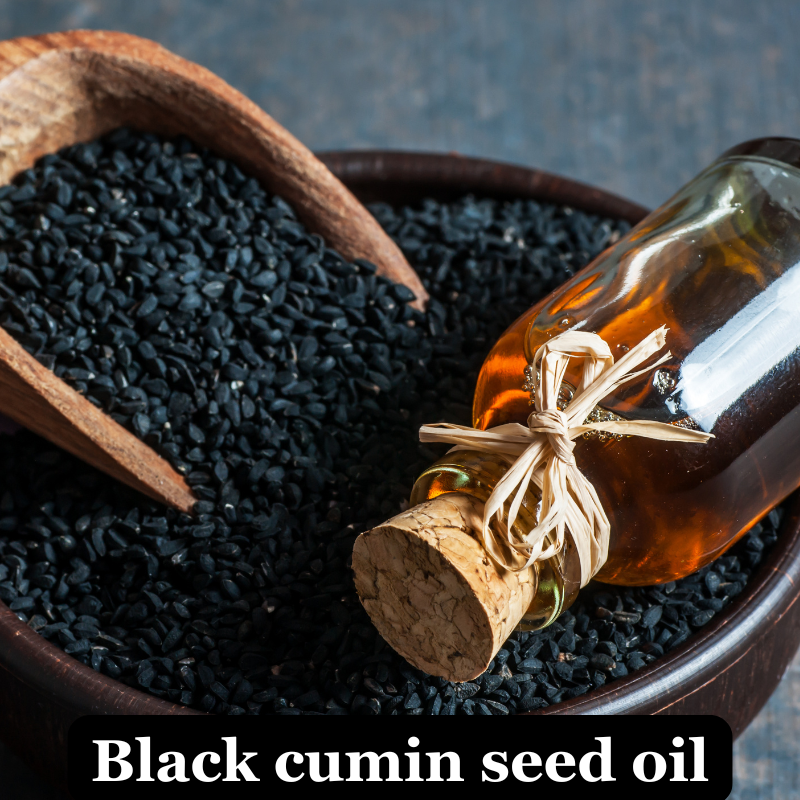Boost Your Brain and Body with Black Cumin Seed Oil

Our food should energize and heal us. We sometimes prioritize satisfying cravings over the nutritional value of food. The constant battle against inflammation is never ending. Free radical act like little gremlins running around your body, causing chaos and mischief. They lay waste to the normal operations of the cells, leaving irreparable damage, which worsens as time progresses. Our eating habits either aid or harm this process.
Antioxidants function as gremlin catchers. While they have different forms, the aim is to provide your body with these anti-inflammatory molecules. Cell damage builds up, potentially causing cancer, autoimmune disorders, metabolic syndromes, and heart disease. Although these are serious problems, everyday difficulties, such as low energy, brain fog, and musculoskeletal pain, might still leave you feeling not so great.
Black cumin seed oil came up in conversation and lead me down a path of curiosity. There seems to be an ever-growing sea overflowing supplements and the promise of products which offer some miraculous health benefit.
The question, does it really work?
Evidence does supports the use of black cumin seed oil (Nigella sativa), with its active compound, thymoquinone (TQ) probably because it exhibits anti-inflammatory, antioxidant, and antimicrobial properties.
This supplement exhibits a broad range of health benefits. Like all nutrients, this is not some miracle cure all to chronic disease but TQs applications offer some promise.
The stronger evidence shows improvements in blood pressure, diabetes, asthma, heart health and reduction in inflammation related disorders like arthritis.
So would you benefit from using this supplement? Well let’s look at the research.
Brain Benefits (Cognition and Mood):A 2014 RCT found 500 mg of Nigella sativa twice daily for 9 weeks boosted memory, attention, and thinking skills in healthy older adults. Another 2018 RCT showed 500 mg/day for 4 weeks improved mood and reduced anxiety in teens, helping them feel calmer and more alert. Less stress, sharper mind!
Blood Pressure: A 2016 meta-analysis of 10 RCTs showed Nigella sativa significantly reduces blood pressure, when added to blood pressure meds. A relaxed heart means a happier brain.
Type 2 Diabetes: A 2021 study found 2000 mg/day of Nigella sativa oil lowered blood sugar and cholesterol in diabetic patients, alongside their usual meds. It also protected kidneys in animal studies.
Heart Protection: A 2020 animal study showed TQ protected hearts from the toxicity related to chemo drug damage. There seems to be a lack of targeted high quality human studies, but it’s promising for heart-brain health.
Bonus: TQ fights inflammation, zaps harmful free radicals, and tackles bacteria, helping with arthritis, acne, and fatty liver disease.
Thymoquinone (TQ), a supposedly magical molecule, is like a Swiss Army knife with its ability to target one of the fundamental causes of many chronic diseases. Like most medications, black cumin seed oil isn't a miracle cure. Some of the research shows black cumin seed oil usage was as an adjunct, meaning another treatment accompanied it.
Limitations
Human TQ trial limitations stem from bioavailability issues and inconsistent dosing. Although TQ is typically safe at therapeutic levels (around 1-3 mg/kg in preclinical studies or comparable Nigella sativa amounts in people), high doses could harm the liver or kidneys, and it might react negatively with other medications. Because TQ is lipophilic and needs oil-based or nano-formulations for best absorption, Nigella sativa oil or capsules are better choices for consumption.
We need more large, long-term studies to prove TQ works for ongoing health issues like cancer and heart disease. Seems to work better with other stuff, less so by itself. One important distinction with black cumin seed oil evidence stems from the research surrounding the efficacy. Its use was always with beneficial lifestyle changes.
Plan
A quick review shows TQ confers benefits for brain, heart, diabetes and inflammatory health.
To dose, start with 500–1000 mg/day of high-quality Nigella sativa oil (look for cold-pressed, organic). Try capsules or drizzle the liquid in smoothies, salads, or soups. Talk to your doctor first, especially if you’re on meds for diabetes, blood pressure, or asthma, to avoid any mix-ups.
TQ is not some cure-all. It’s benefits will not put out the fire caused by a sedentary lifestyle, excess ultra processed foods, poor sleep or chronic stress. Try it out, maybe your energy, focus, or mood shifts, then build from there. Let’s keep your brain sharp and body strong!